2011 archives
Current Groups
book group 55: February 13-23, 2012 (ten days)
led by Courtney Zoffness
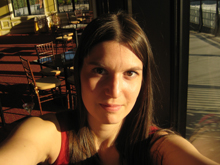
- Courtney Zoffness
Many of the classic love stories we most revere revolve around ill-fated courtships. Romeo & Juliet. Anna Karenina. While storytelling styles may have evolved since Shakespeare and Tolstoy, the themes have endured. “How to Be the Other Woman” by Lorrie Moore and “Love & Obstacles” by Aleksandar Hemon both follow characters down misguided paths to intimacy and affection. As a group, we’ll explore how Moore and Hemon, two vastly different but widely acclaimed contemporary authors, use a range of narrative techniques to create drama and impact our sympathies. What’s the effect of Moore’s second-person point of view—one that implicates us in her heroine’s infidelity? How does the threat of war in Bosnia reflect in the sexually desperate young boy’s misadventures in Hemon’s “Love and Obstacles”? And what compels us, despite the cynicism buried even in these stories’ titles, to read on?
Courtney Zoffness received her BA from Penn in 2000 and periodically teaches courses through Penn’s Center for Programs in Contemporary Writing. Her fiction has appeared in Indiana Review, Washington Square, Saint Ann’s Review, Tampa Review, the Fish Prize Stories anthology, and elsewhere, and was twice nominated for Best New American Voices. She was a Bread Loaf Writers Conference scholar, a Vermont Studio Center resident, and a Davenport College teaching fellow at Yale University in 2009 and 2011. Since her Kelly Writers House-filled days at Penn, Courtney has instructed writing and literature at eight colleges in as many cities, including the University of Freiburg in Germany. She resides most of the time in Brooklyn, New York, and is working on a novel.
book group 56: October 15-25, 2011 (ten days)
led by Sam Apple
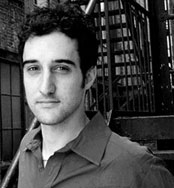
- Sam Apple
Great comic essays tend to make us laugh out loud. But that's not the only thing they have in common. More often than not, an undercurrent of despair sits just beneath the surface of a funny essay. No comic writer traversed the space between laughter and suffering more adeptly than David Foster Wallace, and this class will look closely at three Foster Wallace essays that are at once hilarious and devastating. We'll start with "A Supposedly Fun Thing I'll Never Do Again," then move on to "Getting Away from Already Being Pretty Much Away from It All," and conclude with "Big Red Son" -- Foster Wallace's unforgettable account of an adult video convention. Along the way we'll take note of the relationship between the funniest and saddest passages in the essays and try to make sense of the strange relationship between the two seemingly contradictory emotions.
Sam Apple teaches creative writing at Penn and Rutgers-Camden and is the editor-in-chief of The Faster Times. A graduate of the creative nonfiction MFA program at Columbia University, Apple has served as the editor-in-chief of New Voices Magazine and has written for The New York Times Magazine, The Financial Times Magazine, ESPN The Magazine, and Slate.com, among many other publications. His first book, Schlepping Through the Alps, was a finalist for the PEN America Award for a first work of nonfiction. In 2005, he received the annual Faux-Faulkner award. His second book, American Parent, was published in 2009 (Ballantine).
book group 57: November 1-30, 2011 (one month)
led by Al Filreis
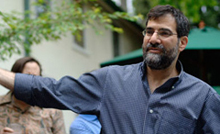
- Al Filreis
John Barth is one of the most famous and admired of the American postmodern novelists. From the 1950s on, he published what was called "meta-fiction." Participants in this month-long discussion of Barth's writing will need to purchase two of his books: Lost in the Funhouse and The Development. The first was a breakthrough collection of experimental short prose pieces. The second is a recent collection of short stories about suburbia and aging and conformity. We will read three or four of the pieces from Lost in the Funhouse and three or four stories from The Development. John Barth is one of the spring 2012 Kelly Writers House Fellows. He will be visiting KWH in later April and participants in this discussion group will be especially welcome to visit campus during Barth's visit, or at least watch his reading and discussion through live video streaming
Al Filreis, Kelly Professor and Faculty Director of the Writers House, has led many online book groups and has taught several all-online semester-long courses. He has won many teaching awards (Lindback, Ira Abrams) and was named the Pennsylvania Professor of the Year by the Carnegie Foundation. He produced and hosts several podcasts, writes several blogs, and maintains vast web sites on modern poetry, the cold-war culture of the 1950s, and the Holocaust. He has published four books including, most recently, Counter-Revolution of the Word: The Conservative Attack on Modern Poetry. Here is Al's web site.
book group 58: January 15-25, 2012 (ten days)
led by Susanna Fry
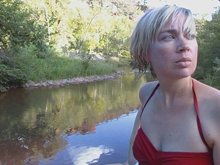
- Susanna Fry
Many women poets have been advised not to have children. However some decide to not only have kids but choose to write about the process. In this group we will take a close look at work by poets Bernadette Mayer and Laynie Brown including excerpts from The Desires of Mothers to Please Others In Letters and The Desires of Letters, examining their connections and disconnections. We'll use these texts to interrogate the relationship(s) between writing and mothering, writer and reader, and creation and destruction. We'll ask ourselves: What does it mean to write letters? To whom is the published letter intended? In 10 days we'll explore the intersections between these creative acts, questioning how they push up against each other and how (or if) they merge.
Susanna Fry is an avid letter writer. She spent the summer solstice of 2007 on a writing retreat with Bernadette Mayer. That fall she and Bernadette kept in touch through letters. In the past several years, she has taught writing in a variety of settings including a homeless shelter, Baptist church, and correctional facility. Susanna has published poems in such journals as Boog City, How2, Five Fingers Review, among others. She is the Assistant Director of the Critical Writing Program at the University of Pennsylvania.
book group 59: February 1-10, 2012 (ten days)
led by John Richetti
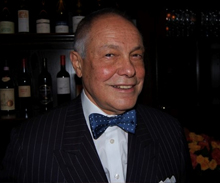
- John Richetti
Shakespeare’s Sonnets were published in 1609, 154 of them, constituting what is called a sequence, which means that these fourteen-line poems when read in sequence tell a story and revolve around a few recurring themes. Such sequences were popular in Shakespeare’s time, the poetic form having been brought to England early in the 16th century from Italy by Sir Thomas Wyatt and popularized at the court of Henry VIII by Henry Howard, Earl of Surrey. Like other sonnet sequences stretching back to Francesco Petrarch, the Italian master of the form, Shakespeare’s have to do with love, its pleasures and pains, with the passage of time and the pathos of mortality that love in its intensity can dramatize, and with the power of poetry to overcome or to compensate for these human limitations. It’s worth noting that most of the sonnets are addressed to a young man. We will read a selection of eleven: #s 2, 17, 18, 19, 29, 30, 73, 94, 129, 138, and 154. If you go the PennSound website, you will find all of these recorded (with many others) by me. We will discuss not just each of these sonnets but my reading of them.
John Richetti is A.M. Rosenthal Professor (emeritus) of English at the University of Pennsylvania, from which he retired three years ago. He has published widely in the field of Eighteenth-Century English Literature (see the bio on the Penn English Department web site) and has in the last few years recorded a fair number of English poems on PennSound, including about half of Shakespeare’s Sonnets.
book group 60: March 1-21, 2012 (one month)
led by Myra Lotto and Michael Gamer

- Myra Lotto
Our subject will be "Romanticism," a famously ill-defined term used as catch-all for the movement, mood, theory, and revolution that followed the Enlightenment and preceded the realism of the Victorian era. We will consider this period of writing – roughly1789-1830 – as one of great fluidity and change, as both a reaction to antiquity and a precursor to modernity. By framing the period as a transitional one, we can think through what it means to abandon old kinds of writing for new and supposedly more liberated ones. We’ll ask what it means to stage an intellectual revolution, what “Romantic” means for those who seek to be liberated on paper and in life, and how Romantic writers sought to present themselves as forever innovating and pioneering even when their creativity had faded. Our reading list includes short works by major poets (Blake, Smith, Wordsworth, Coleridge, Shelley, Keats, Byron).
Myra Lotto is a proud Penn Quaker and has been a member of the Writers House community since its inception. She holds BA (CAS ’99) and AM (SAS ’06) degrees in English from Penn and, by the time this book group happens, will have completed the PhD. She has taught for the Critical Writing Program, the Department of English, and the College of Liberal and Professional Studies at Penn.

- Michael Gamer
Michael Gamer joined Penn's English Department in 1994 and this will be his fourth KWH Alumni Book Group. Author of Romanticism and the Gothic: Genre, Reception, and Canon Formation (Cambridge, 2000) and most recently editor of Wordsworth and Coleridge's Lyrical Ballads (Broadview Press, 2008), he is currently at work on two books: Recollections in Tranquility: The Collected Author and the Institutionalization of Romanticism; and A History of British Theatre: Staged Conflicts, under contract with Blackwell Publishing. He has also published essays in MLQ, PMLA, Novel, ELH, Nineteenth-Century Contexts, Studies in Romanticism, and other journals on poetic collections, the novel, pornography, popular culture, authorship, and dramas of spectacle. Recently awarded the Nineteenth-Century Studies Association 2010 prize for best article (for "Mary Robinson and the Dramatic Art of the Comeback"), he also is recipient of the Ira Abrams, Lindback, and College of General Studies awards for distinguished teaching.
book group 61: May 9-19, 2012 (ten days)
led by Patrick Bredehoft

- Patrick Bredehoft
“A song is anything that can walk by itself.” ~Bob Dylan
Widely regarded as one of the greatest songwriters of the last half century, Bob Dylan sometimes seems bent on destroying our notion of what constitutes a “song”. Whether through his appropriation of others’ music, his cat-strangling vocals, or his stubborn refusal to deliver neatly-wrapped lyrical packages, one of Dylan’s defining characteristics is his refusal to play to our expectations.
An ongoing form of lyrical experimentation in Bob Dylan’s work is his series of “talkin’ songs”: winding conceptual narratives, often set to music but lacking a traditional chorus or refrain. These Talkin’ Songs extend from some of his earliest creative work to some of his most recent music, highlighting the songwriter’s progression through various modes of thought as he reinvents his relationship to his audience.
During this 10-day reading group, we’ll explore a collection of these Talkin’ Songs as a form of abstract poetry masquerading as popular music. Blending wit, vision, and an impish refusal to conform, Dylan carries us through his dreams, unfurls declarations of freedom, and invites us to listen when he’s just talking. Using his lyrics as our source texts (focusing on one or two new songs each day), we’ll discuss why Dylan occasionally chooses to talk—rather than sing—and to consider what he’s saying when he does so.
Patrick Bredehoft works in the Penn Undergraduate Admissions Office, reading applications from Canada, the Caribbean, and several Rocky Mountain States. He is also the liaison between the UGAO and the Kelly Writers House. Before coming to Penn, Patrick was an IB English teacher and college counselor at a small boarding school located outside of Istanbul, Turkey, where he also served as Head of Foreign Languages. Patrick holds a BA in Literature & Creative Writing from Dartmouth College and a Masters of Arts in Education from Lesley University. He attended his first Bob Dylan concert at the age of fifteen and has been hooked ever since.
book group 62: May 20-30 2012 (ten days)
led by Al Filreis and David Roberts
Published in 1934, Appointment in Samara is John O’Hara’s first novel. On successive days, Julian English commits three impulsive acts of not-quite-unforgivable behavior in social situations, which are serious enough to damage his reputation, his business, and his relationship with his wife. For each of the incidents, the omniscient narrator never actually shows us the details. Nor does O'Hara give readers any obvious cause or explanation for Julian’s behavior, which is apparently predestined by his character. Is this novel an instance of literary Naturalism (in the mode of Dreiser or Zola or Stephen Crane)? Does it reward close attention beyond its status and reputation as a steamily frank presentation of sensuous details?
Al Filreis, Kelly Professor and Faculty Director of the Writers House, has led many online book groups and has taught several all-online semester-long courses. He has won many teaching awards (Lindback, Ira Abrams) and was named the Pennsylvania Professor of the Year by the Carnegie Foundation. He produced and hosts several podcasts, writes several blogs, and maintains vast web sites on modern poetry, the cold-war culture of the 1950s, and the Holocaust. He has published four books including, most recently, Counter-Revolution of the Word: The Conservative Attack on Modern Poetry. Here is Al's web site.
David Roberts is a member of the Kelly Writers House Advisory Board, a denizen of the KWH book groups and when he is not reading, works in Manhattan in the investment business. He is a 1983 graduate of the University Of Pennsylvania.